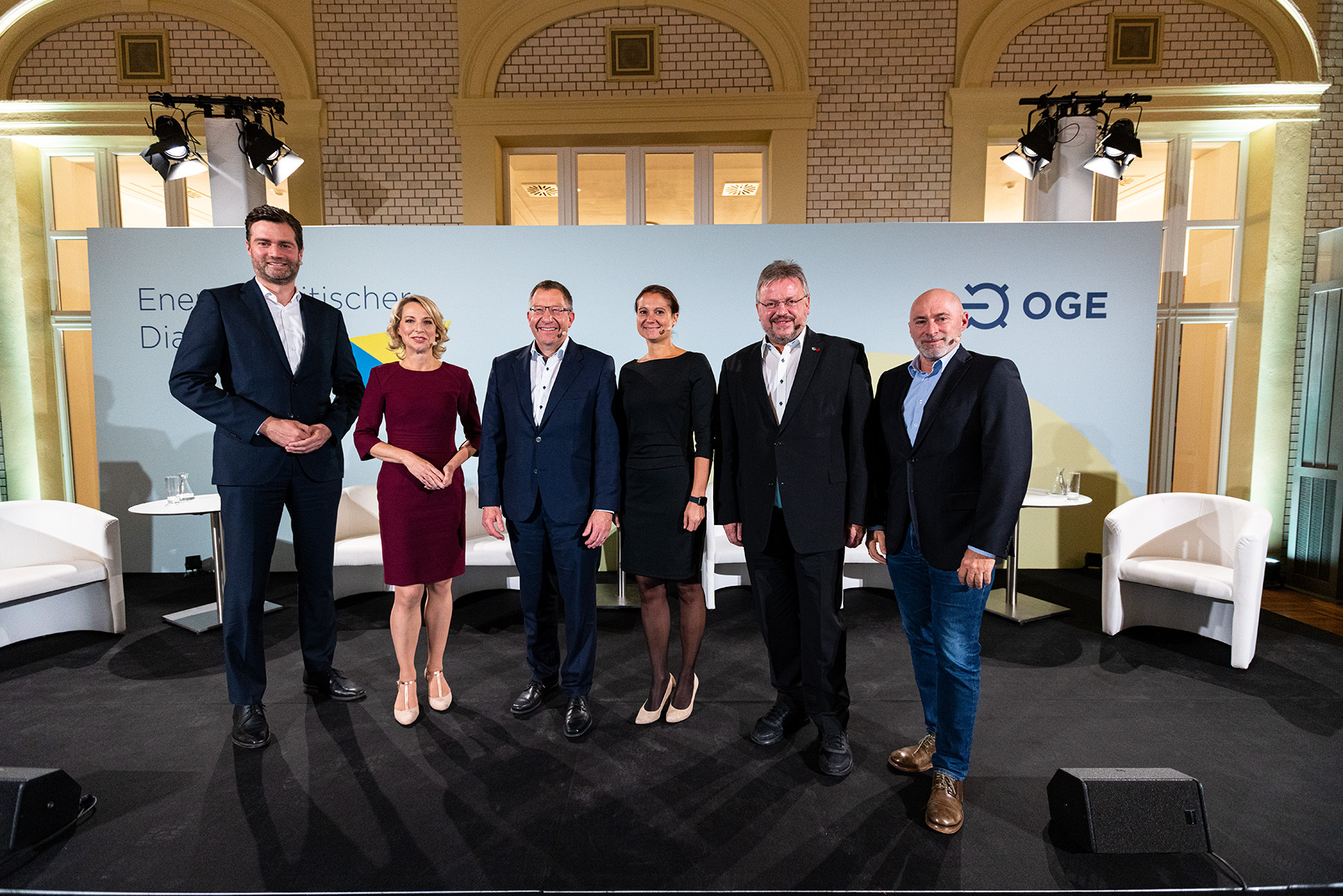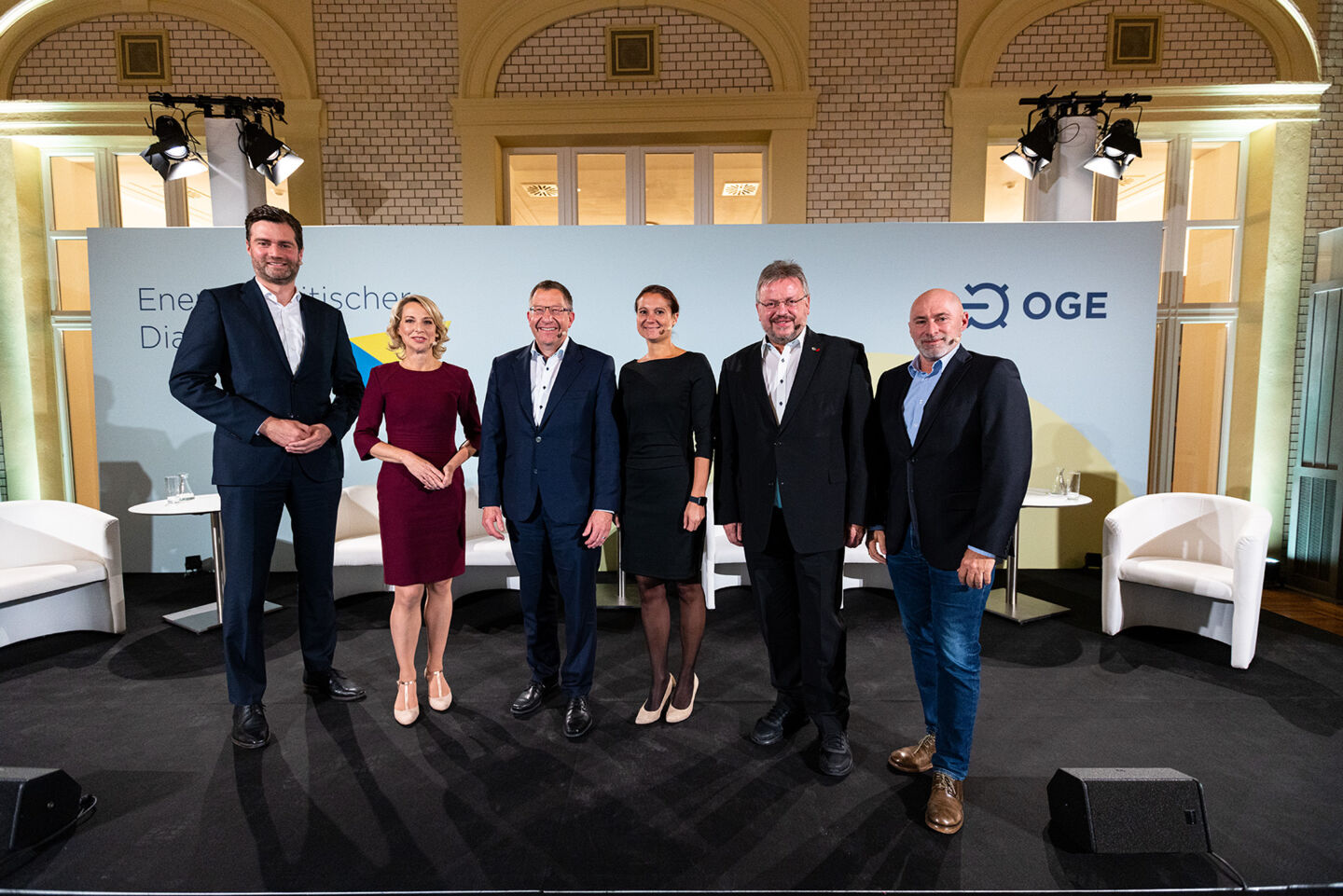
29 Sep 2022
Berlin
OGE
Press release
Hydrogen in times of fundamental change – OGE's Energy Policy Dialogue hosted in Berlin for the first time puts focus on the hydrogen ramp-up and infrastructure
For the hydrogen ramp-up to succeed now, industry and politics need to work hand-in-glove. What this cooperation should look like and how politicians at federal and state level and industry can support each other was the subject of the 8th Energy Policy Dialogue 2022 hosted by OGE in Berlin for the first time.
Under the title "Hydrogen in times of fundamental change – Where are we one year after the Bundestag elections?", Andreas Rimkus MP (Hydrogen spokesperson for the SPD parliamentary group in the German Bundestag), Dr Marie Jaroni (Head of Decarbonization at thyssenkrupp Steel Europe AG), René Rock MP (Chairman of the FDP parliamentary group in the Hessian state parliament and energy policy spokesperson), Dr Patrick Wittenberg (member of the Management Board of Westnetz GmbH in charge of Special Technology and Digitalisation) and Dr Jörg Bergmann (CEO of OGE) engaged in a passionate debate with 100 guests at the F.A.Z. Atrium. The event was moderated by Ina Böttcher.
OGE CEO Dr Jörg Bergmann opened the parliamentary evening with a look back on the German government’s work over the past twelve months: "The traffic light coalition has defined very ambitious targets for hydrogen in its coalition agreement, and the Russian war of aggression has now added another dimension to energy policy challenge. In order to quickly become independent of Russian gas, the rapid ramp-up of hydrogen production and usage is all the more urgent. The political course must be set now, so time is of the essence – now more than ever."
The panel discussion focused on what is needed to start the hydrogen ramp-up and thus make a real contribution to achieving the climate goals.
The development of clear steering options based on an updated National Hydrogen Strategy was said to be one important prerequisite. Andreas Rimkus, Member of the German Bundestag (SPD), said: "We urgently need an update of the National Hydrogen Strategy! A Hydrogen Strategy 2.0 must pave the way for the ramp-up of the hydrogen economy and should finally become the central, strategic steering instrument for sector coupling!"
René Rock (FDP), member of the NRW state parliament, expressed a similar opinion: "We should stop discussing the colours of hydrogen because it’s time to start implementing the hydrogen economy with maximum openness to different technologies. We have already lost enough time."
The industry, meanwhile, is ready to invest and is already doing so today. Dr Marie Jaroni, Head of Decarbonisation at thyssenkrupp Steel Europe AG, said: "Since the German elections, we have set the course for a successful transformation at ThyssenKrupp – also with the support of Berlin and Düsseldorf." Commenting on the hurdles still to be overcome in the hydrogen ramp-up, she added: "Huge efforts are still needed to develop the hydrogen economy and infrastructure, especially when it comes to accelerating hydrogen availability – we must do all we can now to ensure that Germany and Europe can make rapid progress here. The transition to a green industry is a huge task and it can only succeed if companies, politicians and society pull together."

The panel participants from left to right: Dr Patrick Wittenberg, Ina Böttcher, Dr Jörg Bergmann, Dr Marie Jaroni, Andreas Rimkus, René Rock
It was also noted that from the gas transmission system operators' point of view, it would be necessary to guard against risks during the ramp-up phase so that hydrogen transportation by pipeline can be competitive. Moreover, appropriate unbundling rules were still missing from the EU gas market package: the current rules for independent network operators should also apply to hydrogen network operators. In addition, there was a need for efficient joint structures for natural gas and hydrogen grids even after 2030.
Dr Patrick Wittenberg, Member of the Management Board of Westnetz GmbH in charge of Special Technology and Digitalisation picked up on the efficient use of joint structures for natural gas and hydrogen and said: "Germany can draw on a 550,000-kilometre natural gas network. This is infrastructure that does not have to be planned or built. It is already in place and it already reliably supplies gas to millions of households and businesses. Parts of this infrastructure can in future be used for the transportation of hydrogen. This is a real shortcut on the way to the hydrogen economy."
Dr Jörg Bergmann concluded: "This Energy Policy Dialogue in the heart of Berlin was a premiere for OGE. It has shown once again that without the right infrastructure, hydrogen will not reach the customers or not even make it to Germany. This is why landmark political decisions are needed now. Producers, importers, infrastructure operators and customers have to make investment decisions over the coming months. To be able to do so, they need certainty, which only politics can provide. I think we have made a contribution to the debate today."

